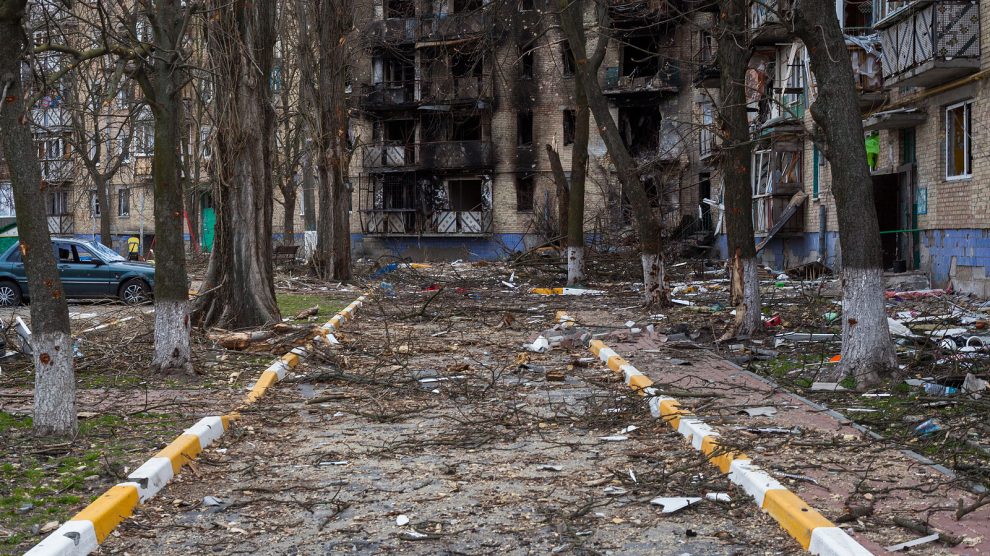An estimated 14 billion US dollars will be needed for priority reconstruction and recovery investments in 2023 alone.
Over the course of the past year, Russia’s war on Ukraine has resulted in damages amounting to 411 billion US dollars. This is the conclusion of the second Rapid Damage and Needs Assessment (RDNA2) report prepared by the World Bank, European Commission, United Nations and the government of Ukraine.
The report, released on March 23, covers the period from February 24, 2022 – the date Russia launched its full-scale invasion to February 24, 2023 and includes a wide range of sectors.
Hardest hit was infrastructure with transport, housing and energy accounting for half of the country’s financial needs.
Direct damage to buildings and infrastructure amounts to 135 billion dollars. Damage to the energy sector saw a particular increase due to Russian strikes on critical infrastructure over the winter period.
- The last word: Rebuilding Ukraine begins with rule of law
- (Re)building Ukraine
- ‘Calm in Kyiv and war in the East’: To prevent eternal conflict, Ukraine’s allies must do more
The stated 411 billion US dollars will be needed over the course of a decade and amounts to 2.6 times Ukraine’s estimated GDP for 2022. The figure accounts for inflation, market conditions, surge pricing in construction, higher insurance premiums, as well as lower energy intensity and modernisation.
An estimated 14 billion US dollars will be needed for priority reconstruction and recovery investments in 2023 alone. The Ukrainian government has already set aside three billion US dollars in its 2023 budget but a further six billion US dollars in unfunded budget needs and five billion US dollars in financing for the public and private sectors are still needed.
On a positive note, certain needs have already been met since the first first Rapid Damage and Needs Assessment (RDNA1) with the support of international partners. Over 500 health facilities have been repaired and the provision of equipment, materials and financing has facilitated repairs in the transport and energy sectors.
At the report’s release, World Bank Vice President for Europe and Central Asia Anna Bjerde said that Ukraine’s recovery and reconstruction will take several years.
“The good news is that the country’s resilience and determination as well as partner support during the invasion is containing damages and reducing the needs,” she adds.
Frontline dynamics
As the war has entered a new phase, so has its impact. A notable difference from the RDNA1 is that damage has been more localised in frontline areas. The hardest hit oblasts are Donetsk, Kharkiv, Luhansk, Kherson, Zaporizhzhia and Kyiv, with the first four seeing the largest increase in needs due to intense fighting.
This has resulted in a smaller increase in damage since June 1, 2022 than initially expected. The report does not include data from the occupied regions, but Prime Minister of Ukraine Denys Shmyhal stresses: “When the defence forces release them, we expect that the data will be supplemented, and the government will immediately begin restoration work in these territories.”
Ukraine has not undertaken any large-scale offensives since the successful Kharkiv counteroffensive in September and the liberation of Kherson in November. The frontline has largely remained static in recent months. Bombardments on critical infrastructure by Russiandrones have seen an increase as a percentage of total damages as a result.
Fierce clashes continue in the frontline city of Bakhmut where Ukrainian defenders have been pushing back assaults by the Russian army and Wagner Group mercenaries. The now months-long Russian offensive has been losing pace according to the latest intelligence update by the UK’s Ministry of Defence.l, which said on March 22 that: “There is a realistic possibility that the Russian assault on the town is losing the limited momentum it had obtained, partially because some Russian MoD units have been reallocated to other sectors.”
The situation is likely to change in spring as Western partners foresee a window of opportunity for another major Ukrainian offensive.

International support
Support from international partners has been invaluable in limiting damages and meeting the country’s financial needs. The report was released as Ukraine received 1.5 billion euro in aid from the EU’s Macro-financial Assistance (MFA) Plus package for macroeconomic stability and restoration.
In January 2023, in line with the July 2022 Lugano Declaration for the Reconstruction of Ukraine, the EU launched a Multi-agency Donor Coordination Platform. Its goals are to facilitate coordination between international donors in order to support Ukraine’s repair, recovery, and reconstruction process.
The International Monetary Fund meanwhile announced onMarch 22 a four-year financing programme worth 15.6 billion dollars – the largest in history for a country at war.
“The overarching goals of the authorities’ program are to sustain economic and financial stability in circumstances of exceptionally high uncertainty, restore debt sustainability, and support Ukraine’s recovery on the path toward EU accession in the post-war period,” said IMF official Gavin Gray.
The IMF wants international partners to play a major role in rebuilding Ukraine and hopes the latest plan will bolster long-term commitment.
In order the to make use of this increase in financial availability, the report outlines recommendations for the Ukrainian government. Scaling up institutional capacity and developing common systems and processes will ease the reconstruction process. The country will have to develop private and public financing strategies for different sectors and long-term planning will be crucial in the coming years.
Unlike many news and information platforms, Emerging Europe is free to read, and always will be. There is no paywall here. We are independent, not affiliated with nor representing any political party or business organisation. We want the very best for emerging Europe, nothing more, nothing less. Your support will help us continue to spread the word about this amazing region.
You can contribute here. Thank you.


